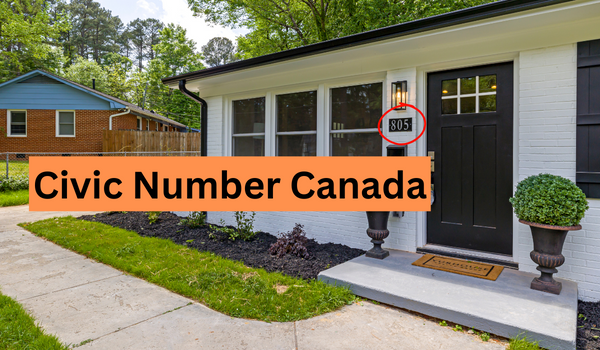In this article, you will get to know about the Civic Number Canada: What is a Civic Number and What Does It Mean? All We Know. In Canada, a civic number is a unique number that is allocated to residential and commercial possessions through a local municipality. This number denotes the locality of the municipal ward or county with a complete postal address. This number is addressed in every Canadian house, building, and workplace that helps the individual in case of any emergency. To know furthermore essential details regarding the Civic Number Canada, what it is, and more, continue browsing this article.
Civic Number Canada
Civic Number Canada is a unique identifying assigned number of the proper that the federal Government assigns. This number is used as a identifying prove to help the emergency services. Each Canadian property is complete with a postal address that is made up of the civic number, postal code, and street name.
This number is a main physical feature for the emergency responders to have easy access to locate the source by calling 9-1-1. In some of the places, the civic number is mentioned on the displayed address of the property. This is made to identify in an emergency easily, and mostly of the time, the civic number matches with the individual mailing address.
|
Important Links |
What is a Civic Number
A civic number is assigned a digit to every house in Canada. This number is made through the federal municipality of each Canadian province. This number refers to the 911 address that helps in the event of an emergency where you require the help of the police, ambulance, or firefighters.

This number is made on every household, workplace, and building which are designated with a civic address. This number is a part of your address, which refers to the attached number 9-1-1 operator. This number is the same as your mail number, but in some cases civic number could be 46589.
What Does It Mean?
The Civic Number is a Government-assigned number that helps work as a building identification. It is a number to measure the distance of the building from a specified starting point. It works in the form of a zero point and goes higher in number according to the distance.
A civic number denotes the building identification, which is determined through a municipality. Each number has its different rules according to its numbering, even and odd numbers are posted at the different sides of the street. The urban areas property landlord is liable for posting the civic number, and in rural areas, its benchmark is reflective of the green sign.
|
Important Links |
How to Get a Civic Number?
The processing of civic numbers varies according to the municipality. To get the civic number, you need to contact the municipality planning office, which is the leading authority of a civic number. Individuals can also have it through the provincial organization. But for both of these, you are required to have a valid document that includes the basic description of the property location, property size, and the certain document that specifies your ownership of the property.
To get this number, you can locate to your nearby planning office with an assigned civic address. After that, you are required to fill out a civic address request form. Fill that form with the required information in the form and submit that required application to the municipality planning authorities with the valid documents. By visiting your nearby municipality office, you can get your civic number just after filling out a request application form.
All We Know
A civic number in Canada an identified proves that it helps individuals to know about the places and also helps them during their emergency time. This number helps the Canadian with the where there are multiple pieces of property in a single street.
It is the responsibility of the landlord to put their civic number at the end of their driveway, which is visible to the road. This is very helpful for delivery services and mail, emergency, telecommunication, and other for navigation.
To read other articles, Click Here